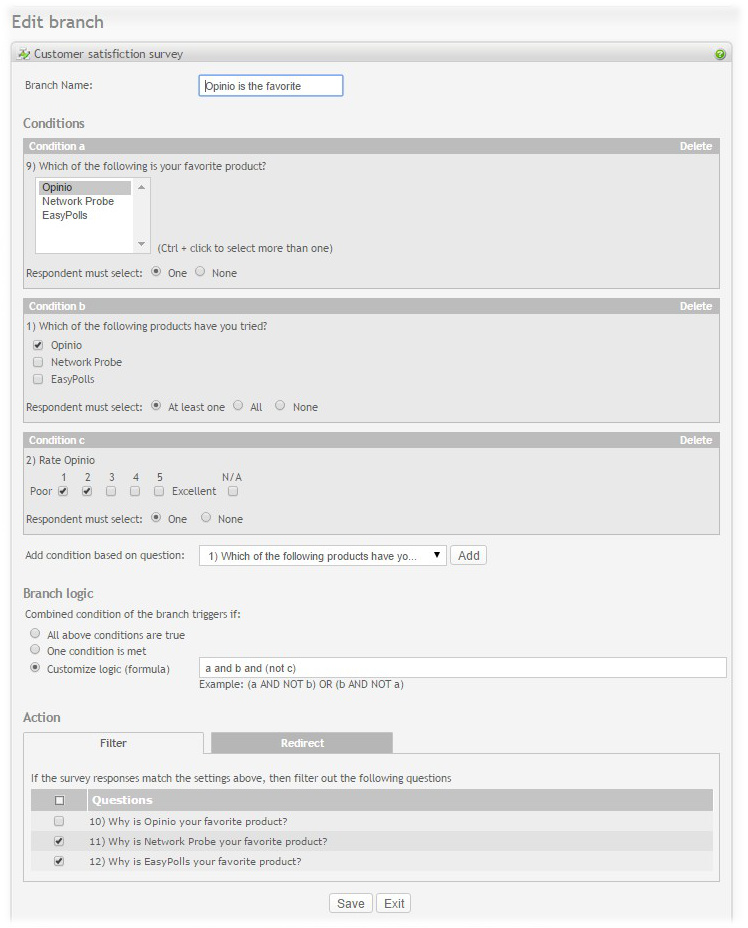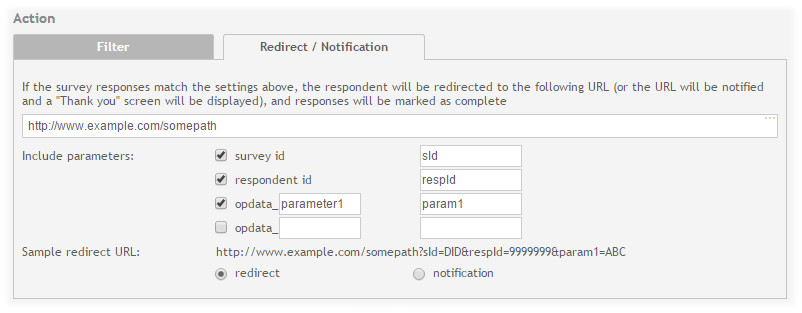The branching setup screen is divided into 4 parts:

- The branch name: Give the branch a name. The name is not visible to respondents, but is used to identify the branch in the branching overview screen.
-
The branch conditions: Based on the question type (rating, multiple choice, etc.), each condition evaluates to true or false. For some of the question types, there are options on how to evaluate the input:
-
Multiple choice: options are "At least one", "All" and "None" if multiple selections are allowed for the question. If only a single selection is allowed, the options are "One" and "None". "At least one" means that the respondent must select at least one of the options selected in this condition; "One" means that the respondent must select one of the options selected in this condition; "All" means that the respondent must select all of the options in the condition; "None" means that the condition will be true if the respondent selects none of the options selected in the condition.
Important
Using the "All" option for multiple choice, requires some thought. If you select more than one choice, then you must make sure the respondent has the possibility to select more than one choice in the question.
- Dropdown: The options are exactly the same as for Multiple choice.
-
Matrix: The options are the same as for Multiple choice with multiple selections enabled.
Important
Using the "All" option for matrix, you should not select more than one option per row, because the respondent does not have the option of selecting more than one, unless the matrix question is of type "select any cell".
- Rating: The options are "One" and "None". These options mean the same as for the respective Multiple choice condition options. "All" is not relevant, because it is not possible to select more than one value in a rating question.
- Numeric: Conditional branching can also be used with numeric fields. The options are "Min" and "Max". At least one of these two values need to be set. "Min" means that the respondent must answer a value greater than or equal to this minimum value in this condition; while "Max" means that the respondent must answer a value less than or equal to this maximum value in this condition.
Note
For the current version of Opinio, conditions cannot be set for In-text elements.
-
-
The branch logic (formula): The branch will trigger if the branch logic is met, that is, if the respondent selects the values for the questions as defined in the conditions so that the branch logic evaluates to true. When the branch logic triggers, the filter is applied.
Three types of branch logic are provided:
- All above conditions are true : if all of the conditions within the branch evaluate to true, then apply the filter. This is a logical AND of all conditions.
- One condition is met : if one of the conditions within the branch evaluate to true, then apply the filter. This is a logical OR of the conditions.
-
Customize logic (formula) : if the above choices does not suit your need, you can define your customized branch logic (formula) here. Examples for such logic could be: "a AND b OR (NOT c)", "(a AND NOT b) or (b AND NOT a)", etc., where "a", "b" and "c" are the identifiers found in the title of each condition.
Important
The formula must contain condition identifiers of all the conditions in the branch; On the other hand, the formula must not contain any text other than condition identifiers, parenthesis, and the following logic key words: "AND", "OR" "NOT". It is recommended that you use capital letters for the logic key words, but it's not required.
-
The action: Either filter or redirect action can be performed if the conditions are satisfied.
-
Filter:

-
If 'Exclude branching': Depending on the above branch logic (true or false), the questions selected in the filter are not seen by the respondent.
Important
Only questions on subsequent survey pages are displayed in the filter list. If no survey questions are listed in the filter list, it means there are no questions on the survey pages following the question with highest question number in the condition list. Please make sure that there are pages with questions after the page with the current question, or delete the branch.
-
If 'Include branching': Depending on the above branch logic (true or false), the questions selected in the filter are included and visible to the respondent.
Important
Only questions on subsequent survey pages that are initially excluded are displayed in the filter list. If no questions are listed, there are no questions on the subsequent pages that are initially excluded following the question with highest question number in the condition list. Please make sure that there are pages with excluded questions after the page with the current question, or delete the branch. See the section called “Exclude questions” for more information.
-
-
Redirect: Either respondent is redirected to the URL specified here or the URL is notified (called without redirect). In both cases survey completes.
When you start typing address, the section is expanded. This gives a possibility to include built-in Opinio parameters or parameters provided to Opinio (ones that start with 'opdata_'). You are also given a choice to notify the URL address instead of redirecting to it. In this case survey finishes as usually, while Opinio connects to the URL in the background. Notifications can be useful if you want to send some data from Opinio to another system (for example a CRM) if the respondent select a spesific combination of answers.
If you set up both branching redirect URL here and redirect/notification URL at the end of the survey, only the branching redirect will happen if triggered. If you set up branching notification URL here and redirect/notification URL at the end of the survey, then if the condition is triggered, the branching URL will be notified, but also the redirect/notification at the end of survey will be used.
You can choose a custom name instead of any of the built-in parameter names to use in the URL. As for the 'opdata_' parameters, you first specify which of the parameters you would like to add and then select a custom name for it. You can have as many 'opdata_' parameters as you need (rows are added automatically). If there is no such 'opdata_' parameter in Opinio at the moment of redirect, an empty value is used.

-
Invalid filters
If the branch contains invalid filters, the branch needs to be verified.
- If 'Exclude branching': Filters are invalid if they filter out (exclude) questions before or on the same page as the the question with highest question number in the condition list of the branch.
- If 'Include branching': Filters are invalid if they include questions before or on the same page as the the question with highest question number in the condition list of the branch.
The filters may become invalid due to a change of question order or questions/sections have been deleted/modified in the survey. The invalid filters will not be visible in the filter list, but the branch needs to be re-saved with valid filters, or deleted from the branching overview page.